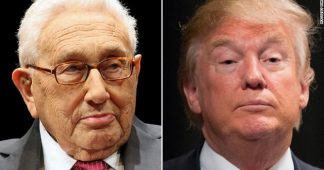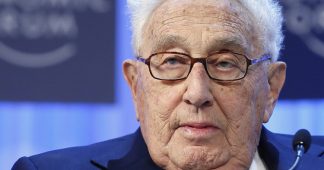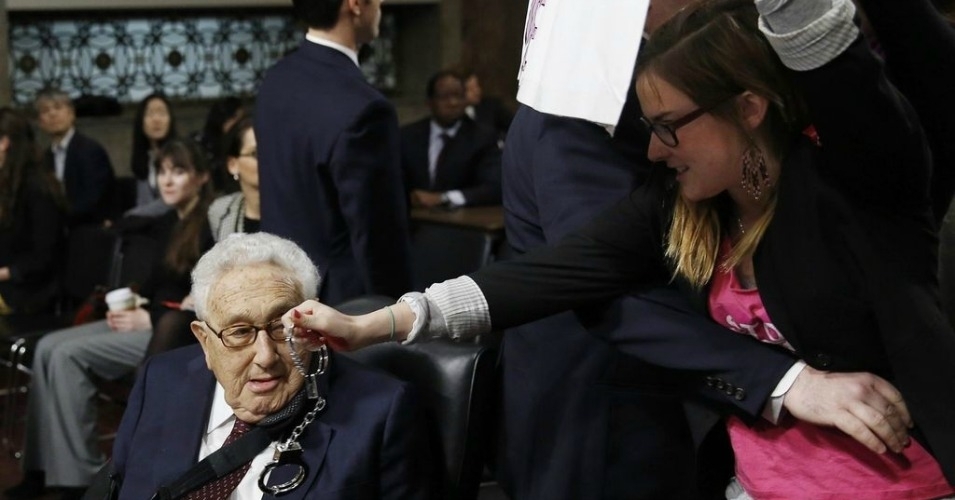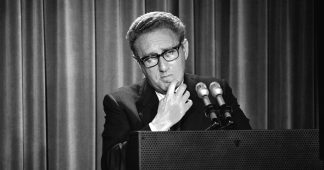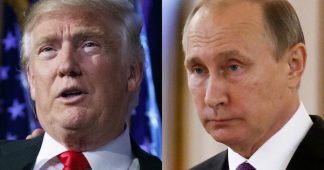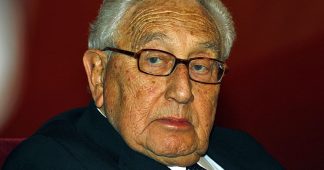He was a mad man, not a realist. He paved the way for disaster after disaster. We still think about him all wrong
Two weeks ago, a mini-scandal rocked the New York literary world. Gawker revealed that Andrew Roberts, the New York Times Book Review’s choice to review the authorized biography of Henry Kissinger, had in fact been Kissinger’s original choice to write the authorized biography.
Roberts also was a long-time friend of Niall Ferguson, the man who Kissinger wound up choosing to write his authorized biography. Roberts and Ferguson had even written a lengthy chapter together in a volume of essays edited by Ferguson. Worse yet: Roberts had revealed almost none of these involvements — with Ferguson, with Kissinger — to the New York Times when it asked him to write the review.
So unseemly were these entanglements, and the lack of transparency about them, that Margaret Sullivan, the New York Times public editor, felt called upon to rap the paper’s knuckles. Which prompted a further back and forth between Sullivan and Pamela Paul, the editor of the Times Book Review. While the back-scratching world of book reviews in the New York Times is an old topic — unlike other publications, the Times purports to be objective and untainted by personal connections, and its reviews help promote or kill books — this scandal brought it into especially sharp relief.
The person who revealed the scandal in Gawker was Greg Grandin, an NYU historian and winner of multiple academic and literary prizes. Grandin has his own book out on Kissinger, “Kissinger’s Shadow,” which was reviewed by the Times the same day that Ferguson’s bio was.
By coincidence, I was scheduled to interview Grandin at the Brooklyn Public Library on the day his review came out. I was thrilled by the prospect. (Full disclosure: Grandin and I are long-time friends. Just in case you thought the personal dimensions of this story couldn’t get any gummier.)
A lot of Kissinger commentary focuses on a simple-minded opposition between two traditions of U.S. foreign policy: the realist tradition, which is hard-headed about power, human rights, and America’s ability to do good in the world; and the idealist tradition, which believes the U.S. should promote freedom and democracy around the globe.
Grandin shows how irrelevant that debate is. His Kissinger is neither a realist nor an idealist; his Kissinger is a “political existentialist.” And where sentimentalists look back on Kissinger’s reign as a time when wise men governed, Grandin shows that there’s a direct link between the insanity of Bush’s Iraq War — and Obama’s endless wars — and Kissinger’s insanity in Southeast Asia, Latin America and Africa.
Beyond the novel interpretation Grandin offers of Kissinger, his book is a literary triumph, a marriage of style and substance that’s rare in books on U.S. foreign policy. Grandin’s chapter on the deeply troubled and personal relationship between Kissinger and Daniel Ellsberg reads like the opening act of a John Adams opera. Grandin manages to take a serious topic — the fantastically strange, and unnerving, worldview of Henry Kissinger — and make it funny. Kissinger’s Shadow is like Dr. Strangelove, but on paper. It shows you how scary Kissinger’s reign truly was, but never lets you forget the farce that was the man.
What follows is an edited transcript of our interview at the Brooklyn Public Library.
There’ve been many books about Henry Kissinger, including critical treatments by Christopher Hitchens and Seymour Hersh. Why do we need another book?
Kissinger is an outsized personality, and in these other books, he tends to outstrip the context. You learn much about Kissinger, but not so much about the national security state that he exemplifies. My book sees in Kissinger the workings of the larger system, the longer arc of post-war U.S. foreign policy.
But I want to also take on the notion that Kissinger is a foreign policy realist, that he’s opposed to the idealist strain of U.S. foreign policy. Kissinger is supposed to think the U.S. should only get into battles it knows it can win, and should only do so in defense of its interests, not its ideals. That notion of Kissinger the realist is often juxtaposed with the adventurism of the neoconservatives who drove us into Iraq. I think that’s a misrecognition of Kissinger, and my book shows how.
Picking up on that, if there’s a through-line in the book, it’s the senior thesis Kissinger wrote when he was at Harvard in the late 1940s. Tell us about this thesis, and why it’s so important to you?
He submitted it in 1950. It was the longest thesis in Harvard’s history. In fact, it supposedly prompted the creation of the “Kissinger rule,” where you aren’t allowed to submit an undergraduate thesis longer than 200 pages.
How long was it?
Four hundred pages.
You did say he was outsized.
It was a meditation on European philosophers and historians: Oswald Spengler, Immanuel Kant and Arnold Toynbee. Its title was “The Meaning of History,” and it reflected its historical moment. It has a strong flavour of post-war existentialism. You read it and you think of Sartre: the idea that life is meaningless, has no purpose, that there’s an emptiness to the universe, that there’s no moral order. But, like Sartre, Kissinger also believed that individuals could act freely and that that the best way to achieve freedom was to accept that meaninglessness and emptiness of history. What’s interesting about that thesis is that you can see how Kissinger refers back to it throughout the years and in all of his critiques of how U.S. foreign policy was practiced.
You say he’s a subjective irrationalist, a political existentialist. What does that mean?
Kissinger says that the past is a series of meaningless events and it is we in the present who impose order on the past by our present concerns. He rejects any and all forms of determinism. He also insists that there is a range of possibilities for action, that there is freedom.
This influences his ideas about diplomacy. The responsibility of statesmen is to recognize that they have freedom to move, they shouldn’t be constrained by the past, they shouldn’t let the past be a prison house of the present. He also believes — and this is where he links up to neoconservatism — that action creates meaning, and that we — states, statesmen, diplomats — don’t know our interests until we act in the world.
There’s a circularity to Kissinger’s thought. Kissinger often is held up as somebody who believes states should act out of a strong sense of interest and purpose. A constant critique that he makes of whatever the current administration happens to be is that it knows how to project power but doesn’t know why it is projecting power. But if you start to peel back the layers and get at what he means by purpose, there’s no “there” there. Ultimately, he believes we have to project power to create purpose and that our purpose is to project power. And that’s a circularity that I think is the motor force of American expansionism.
Again, a traditional realist is someone who believes that there are limits to power and that states have interests, and that have have to operate within those limits to secure those interests. You show that Kissinger has an animus to what underlies that view: namely, cause and effect. He doesn’t really believe that there are causes in the world that affect things.
After the Cuban Missile Crisis, Kissinger has this great line: “There are two kinds of realists. One that observes reality and responds to it, and the other that makes reality.” And what the West needs is the latter. That view was echoed by Karl Rove when he was in the Bush administration: “We’re an empire now and when we act, we create reality.”
This is all in the undergraduate thesis; he explicitly rejects the idea of cause and effect, of causality. We can’t think of the present as the cumulative effect of past actions because the past didn’t cause the present, because nothing causes anything. So you can’t allow the past to determine or even shape what you do in the present; you can dispense with the past.
You can see that idea with someone like Cheney, who will look at Iraq today and say, “Look, we can debate what we did twelve or thirteen years ago, whether we were right or wrong. But there’s a crisis now, and we have to act now to solve that crisis.” That’s Kissingerism: statesmen shouldn’t let yesterday’s catastrophe get in the way of today’s bold action.
Let’s jump ahead to Kissinger in Cambodia, which is probably the biggest foreign policy issue that you deal with in the book. Why does Kissinger in Cambodia matter so much for you?
For a number of reasons:
Kissinger and Nixon took office in early 1969, and one of the first things they want to do is force North Vietnam back to the bargaining table. How are you going to do that? You can’t start bombing North Vietnam right away; they had to honor the cease-fire. So they bombed Cambodia. But they had to bomb Cambodia illegally because they were afraid of public opposition and congressional disapproval.
So Kissinger, along his military aide Al Haig and an air force colonel, came up with a double bookkeeping protocol that allowed them to bomb Cambodia illegally for an extended period, allowing them to account for the munitions, spare parts and fuel they used — without revealing to Congress that they were bombing Cambodia. Kissinger was intimately involved. He picked the targets from the basement of the White House.
Cambodia encapsulates the circularity of American intervention perfectly: we have to escalate so we can de-escalate. But the bombing did the opposite. It led to the U.S. invasion of Cambodia, which accelerated the crisis in Cambodia and ultimately contributed to the rise of the Khmer Rouge.
The justifications Kissinger has offered for the bombing have an interesting and long afterlife. He said we were bombing Cambodia, a neutral country, in order to deny the North Vietnamese sanctuary. Last year, on a book tour, an interviewer asked Kissinger about Cambodia. Kissinger answered that if you want to understand Cambodia, look at Obama’s drone program. Obama, says Kissinger, is justifying his actions in Yemen and Pakistan and Somalia on the same terms that I did in Cambodia: you have to destroy the sanctuaries and safe havens of our enemies, even if those havens are in neutral countries. So Kissinger was invoking today’s wars in order to justify what he did forty years ago, but what he did forty years ago helped pave the way for today’s wars.
In his time, though, Kissinger had to keep his wars secret — Cambodia is the perfect example — and his justifications were largely made in secret. They were considered so far out of the mainstream that even establishment colleagues broke with him. Today they’re mainstream arguments, which Obama makes.
That’s the opening set piece of the book. Thomas Schelling and all these Harvard establishment types, Kissinger’s former colleagues and friends, come to Kissinger to oppose the invasion of Cambodia, which Nixon has just announced publicly. They don’t even know about the bombing. The justification for the invasion is that Cambodia is providing sanctuaries for the North Vietnamese. Schelling says, “As we see it, there are two possibilities: Either, one, the president didn’t understand when he went into Cambodia that he was invading another country; or two, he did understand. We just don’t know which one is scarier.” As you show, the whole notion of invading a neutral country because it was providing sanctuaries to America’s enemy was shocking to the Establishment.
Exactly, except now Obama states it as a commonplace: our enemies will find no safe haven. That was, with Bush, the justification for Afghanistan. It’s the justification for what we do in Pakistan, etc.
You have a chapter called “Anti-Kissinger.” Anti-Kissinger is Daniel Ellsberg. There’s a relationship between these two — Ellsberg and Kissinger — that’s the moral heart of the book. Tell us about Ellsberg — and Ellsberg and McNamara: What did they represent for Kissinger?
It goes back to that undergraduate thesis, in which Kissinger draws heavily from Spengler, the German philosopher of history. One of Spengler’s criticisms is that great civilizations, at the moment of decline, will give themselves over to the accountants, the bureaucrats, the instrumentalists who have no understanding of the empire’s larger purpose; the real sources of an empire’s power are its poets and priests and soldiers. Kissinger embraced Spengler’s critique, but he rejected the fatalism. He didn’t think that decline was inevitable: great men can intervene — indeed, they have the responsibility to do so — in history, slowing the decline or even reversing it.
Before he came to the Pentagon, Robert McNamara was at Ford Motor Company. He believed in all the things that Spengler — and Kissinger — hated. He believed in numbers, in gathering data, in giving an accounting of the Pentagon’s tactics, its expenditures, everything. He didn’t believe in intuition or the intangibles of war; he didn’t believe in the will or spirit. And Kissinger’s critique of McNamara was that he could project power but he did not know why he was projecting power. And that led to McNamara’s fatal flaw: he had “no stomach for endless war.”
Ellsberg is a much more intimate challenge for Kissinger than McNamara was, since their lives are so intertwined. They both went to Harvard; they both were products of the post-war meritocracy. Ellsberg spoke to Kissinger’s class at Harvard. Ellsberg was one of the first people to give Kissinger a tour and briefing about Vietnam during Kissinger’s first visit to the country in 1965. But if you look at Kissinger’s undergraduate thesis, you see that Ellsberg, who uses economic analysis, who cares about numbers and data, Ellsberg is doing exactly the kind of thing that Kissinger says is the sign of an empire in decline. Ellsberg is exactly the kind of “fact man” Kissinger (and Spengler) warned against.
Here’s how Ellsberg, who helped pioneer game theory, wrote: “For any given probability distribution, the probability of outcome a with action III is p(A ∪ C) = PA + PC.” That’s what Kissinger hated.
When Kissinger becomes national security adviser, Ellsberg tells him: This is what you gotta do. You gotta bombard the bureaucracy with questionnaires. The point is not the answers that come back. The point is to establish dominance over the bureaucracy, to force them to answer your questions, and to reveal any potential information or tensions that you can then use against them. Kissinger liked this idea and he applied it. When all the questionnaires came back, he let Ellsberg collate them. And what Ellsberg had was evidence of an unbelievable and insurmountable pessimism in the bureaucracy, the sense that the US had no viable options in Vietnam. Kissinger had basically given Ellsberg permission to data mine the bureaucracy. This created more pessimism and contributed to a sense of siege within the White House. Ellsberg leaked the results to different congressmen. It was like a little pre-Pentagon Paper.
What I loved about that chapter is that you show that Kissinger thinks he’s doing the Kissinger-ian thing by, as you say, ignoring the data and only using it to establish his supremacy in the national security bureaucracy. But what happens is the information — the very thing that Kissinger hated but that he had allowed Ellsberg to procure — comes to constrain Kissinger. It ties him down in the way he predicted it would, yet he was the one who was responsible for getting it. And you also show that Ellsberg, who was supposed to be a witless numbers man, an accountant, is able to play the great game of politics better than Kissinger, the master statesman. It’s these kinds of ironies that make your book such a pleasure to read.
Thanks.
